Page path:
- INTERCOAST
- Education
- Annual INTERCOAST Workshops
- The 3rd Annual INTERCOAST Workshop took place in Bremen, Germany from June 16-23 2012
The 3rd Annual INTERCOAST Workshop took place in Bremen, Germany from June 16-23 2012
Integration of different interdisciplinary aspects of coastal zone and shelf-sea research
The much anticipated annual INTERCOAST workshop was successfully held from June 16 – June 23, 2012, at the MARUM Institute of University of Bremen in Germany. The annual IC workshops provide an opportunity for project leaders (supervisors) and PhD students alike to come together to reflect on past, present, and future research in the framework of the INTERCOAST programme.
This 3rd annual workshop represented the final workshop for the first cohort of University of Bremen IC PhD students, who are now entering the home stretch of their projects aiming for completion around the end of 2012. Students from this group presented the results from their latest work, which resembled the beginnings of final conclusions and foreshadowed their completed works to come! Supervisors from Germany and New Zealand listened as the first cohort showed off the knowledge they have gained over the past 2.5 years proving to all attendees that they have the ability to become successful young working scientists who can make meaningful contributions to the international body of knowledge across a range of different disciplines.
For the first cohort of University of Waikato IC PhD students, this was the 2nd workshop and as such, there were many presentations showing preliminary results from recent field and laboratory studies, and descriptions of attempts at the fine-tuning of research methods. All students showed great promise, and expectations are high for the work that will be presented at their 3rd and final workshop next year in New Zealand!
Thesis committee meetings are also an important part of the IC workshops. Time is always scheduled so that each student can sit down with their Bremen and Waikato supervisors to discuss their progress and upcoming plans. This is a crucial activity as it is far more efficient to discuss these things face to face rather than via email!
Throughout the week, the audience had the chance to benefit from keynote lectures by Drs. Julia Mullarney, Mark Hadfield, Lars Brabyn, and Simon Thrush that provided recent findings in the fields of biological, oceanographic, geographic studies. Additionally, a special evening lecture was given by Professor Chris Battershill on the current events and environmental implications of the grounding of the container ship MV Rena off the coast of Tauranga, New Zealand at the Astrolabe Reef.
This 3rd annual workshop represented the final workshop for the first cohort of University of Bremen IC PhD students, who are now entering the home stretch of their projects aiming for completion around the end of 2012. Students from this group presented the results from their latest work, which resembled the beginnings of final conclusions and foreshadowed their completed works to come! Supervisors from Germany and New Zealand listened as the first cohort showed off the knowledge they have gained over the past 2.5 years proving to all attendees that they have the ability to become successful young working scientists who can make meaningful contributions to the international body of knowledge across a range of different disciplines.
For the first cohort of University of Waikato IC PhD students, this was the 2nd workshop and as such, there were many presentations showing preliminary results from recent field and laboratory studies, and descriptions of attempts at the fine-tuning of research methods. All students showed great promise, and expectations are high for the work that will be presented at their 3rd and final workshop next year in New Zealand!
Thesis committee meetings are also an important part of the IC workshops. Time is always scheduled so that each student can sit down with their Bremen and Waikato supervisors to discuss their progress and upcoming plans. This is a crucial activity as it is far more efficient to discuss these things face to face rather than via email!
Throughout the week, the audience had the chance to benefit from keynote lectures by Drs. Julia Mullarney, Mark Hadfield, Lars Brabyn, and Simon Thrush that provided recent findings in the fields of biological, oceanographic, geographic studies. Additionally, a special evening lecture was given by Professor Chris Battershill on the current events and environmental implications of the grounding of the container ship MV Rena off the coast of Tauranga, New Zealand at the Astrolabe Reef.
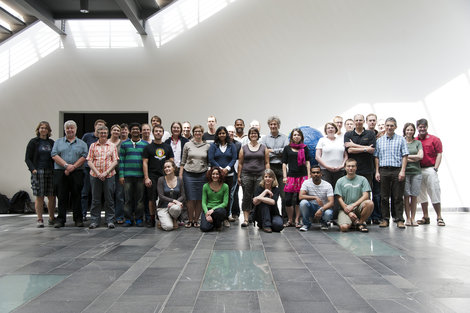
Participants of the INTERCOAST Workshop 2012 in Bremen, Germany.
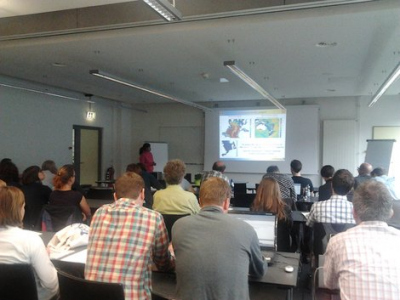
IC PhD student, Nilima Natoo presenting her recent results.
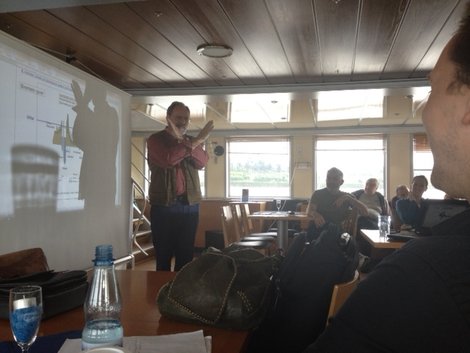
Weser River lecture from Professor Michael Schirmer aboard the ferry en route to Bremerhaven.
Throughout the week, the audience had the chance to benefit from keynote lectures by Drs. Julia Mullarney, Mark Hadfield, Lars Brabyn, and Simon Thrush that provided recent findings in the fields of biological, oceanographic, geographic studies. Additionally, a special evening lecture was given by Professor Chris Battershill on the current events and environmental implications of the grounding of the container ship MV Rena off the coast of Tauranga, New Zealand at the Astrolabe Reef.
Besides keeping one another abreast of current work, the workshop also provided the opportunity for project leaders to put their heads together to devise strategies for the next phase of research projects and discuss plans for the 2nd cohort of students, for which positions will soon be advertised (more to come on that in the coming months)!
The students, along with the New Zealand supervisors, were also treated to an educational (yet adventurous!) tour of the Weser estuary via a ferry ride, which commenced in Bremen City and ended downstream at Bremerhaven. Along for the ride, was Professor Michael Schirmer, an emeritus professor of biology at University of Bremen, whose research focused specifically on the aquatic ecology of the Weser catchment and estuary and the effects of climate change on it. Today, he is still an active player in the planning and maintenance of the estuary and currently serves as the ‘dikereeve’ (the official in charge of the drains, sluices, and sea walls in a district of fen or marshy land), so he was the perfect person to provide the historical and current background on the Weser. He was unflappable even after an unexpected mid-river ferry change due to a broken rudder! The students and supervisors were grateful to him for taking the time to accompany them down the river to provide a stimulating and educational narrative of all the sights.
Besides keeping one another abreast of current work, the workshop also provided the opportunity for project leaders to put their heads together to devise strategies for the next phase of research projects and discuss plans for the 2nd cohort of students, for which positions will soon be advertised (more to come on that in the coming months)!
The students, along with the New Zealand supervisors, were also treated to an educational (yet adventurous!) tour of the Weser estuary via a ferry ride, which commenced in Bremen City and ended downstream at Bremerhaven. Along for the ride, was Professor Michael Schirmer, an emeritus professor of biology at University of Bremen, whose research focused specifically on the aquatic ecology of the Weser catchment and estuary and the effects of climate change on it. Today, he is still an active player in the planning and maintenance of the estuary and currently serves as the ‘dikereeve’ (the official in charge of the drains, sluices, and sea walls in a district of fen or marshy land), so he was the perfect person to provide the historical and current background on the Weser. He was unflappable even after an unexpected mid-river ferry change due to a broken rudder! The students and supervisors were grateful to him for taking the time to accompany them down the river to provide a stimulating and educational narrative of all the sights.
The icing on the cake came in the form of a field trip on the last two days of the workshop, planned and led by project leader Alex Bartholomä. The first stop was to the East Frisian Island of Spiekeroog, where discussions on the geomorphic evolution of the island were interspersed with intermittent and spectacular thunder and lightning storms. Later, participants boarded the ferry to return to the mainland, where they then were treated to what was probably a once in a lifetime opportunity for a scenic aerial tour of the East Frisian Islands aboard a 10 seater ‘puddle jumper’ sponsored by the Senckenberg Institute. The views were breath-taking and allowed for a rare perspective on the variety of coastal geomorphologic landforms that most people only read about in texts books!
Day 2 of the field trip took advantage of the Ems Estuary, which is dominated by two important landmarks: the Emsperrwerk (Ems storm surge barrier) and the Meyer Werft ship building facility upstream at Papenburg. Tours and explanations of both facilities led to some animated interdisciplinary discussions on the costs and benefits of the presence of the two anthropogenic additions to the estuary, and as in the political and societal sphere, consensus on the matter was difficult to come by. However, by now, the students are well-versed in communicating their viewpoints effectively while thoughtfully considering those expressed by their colleagues. All in all, the field trip was filled with experiences that the participants won’t soon forget!
This year’s IC workshop was a great success with progress logged in leaps and bounds. Students communicated their work effectively while honing their skills in the art of interdisciplinary communication. Supervisors led by example and produced a treasure trove of ideas for the future stages of the INTERCOAST programme that aim to combine aspects of the German Wadden Sea and coast with the seas and coastlines of New Zealand. Most importantly, professional and personal bonds were formed and strengthened, which are the foundation for an ongoing and successful collaboration between the University of Bremen and the University of Waikato and the INTERCOAST graduate programme.
Day 2 of the field trip took advantage of the Ems Estuary, which is dominated by two important landmarks: the Emsperrwerk (Ems storm surge barrier) and the Meyer Werft ship building facility upstream at Papenburg. Tours and explanations of both facilities led to some animated interdisciplinary discussions on the costs and benefits of the presence of the two anthropogenic additions to the estuary, and as in the political and societal sphere, consensus on the matter was difficult to come by. However, by now, the students are well-versed in communicating their viewpoints effectively while thoughtfully considering those expressed by their colleagues. All in all, the field trip was filled with experiences that the participants won’t soon forget!
This year’s IC workshop was a great success with progress logged in leaps and bounds. Students communicated their work effectively while honing their skills in the art of interdisciplinary communication. Supervisors led by example and produced a treasure trove of ideas for the future stages of the INTERCOAST programme that aim to combine aspects of the German Wadden Sea and coast with the seas and coastlines of New Zealand. Most importantly, professional and personal bonds were formed and strengthened, which are the foundation for an ongoing and successful collaboration between the University of Bremen and the University of Waikato and the INTERCOAST graduate programme.
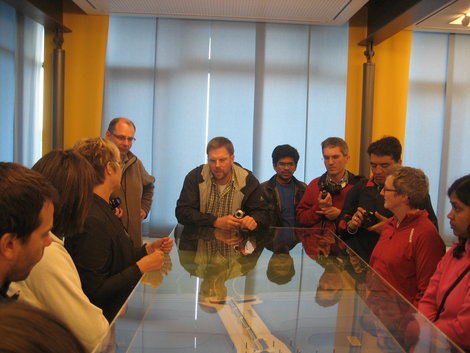
Fieldtrip participants learn about the Emsperrwerk (Ems stormsurge barrier).
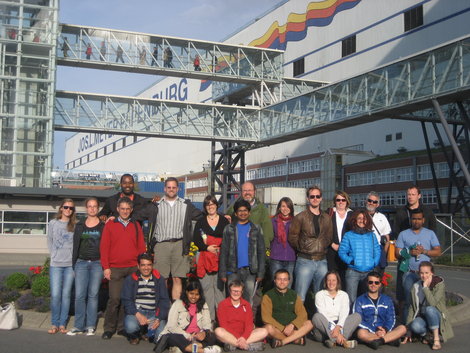
Tour of the Meyer Werft ship factory in Papenburg.
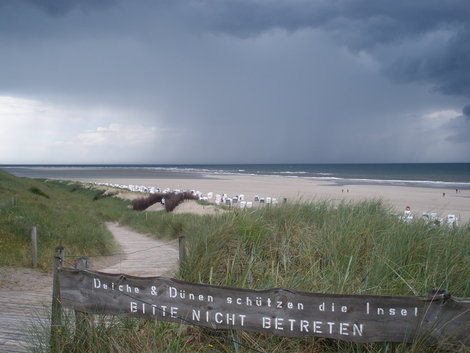
Thunderstorm over Spiekeroog.
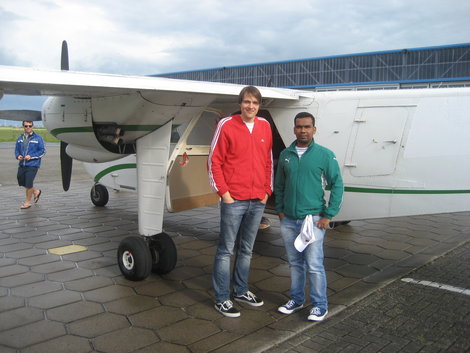
Gerhard Bartzke and Firoz Badesab preparing to board for their scenic tour of Spiekeroog Island.
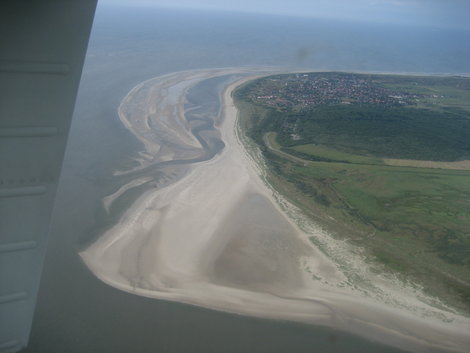
An aerial view of the eastern end end of Spiekeroog Island.

Invited Guests
- Simon Thrush (NIWA)
- Andrew Coker (Priority One)

Guest Speakers
| Michael Schirmer (a dike reeve) | Introduction into the Weser development |
| Simon Thrush (NIWA) | Ecosystems – protection vs use |

Public Lecture
‘House of Science’ (Bremen 19th June 2012)
| Christopher Battershill (Uni of Waikato) | 'News from the BoP - impact of RENA’ |

Expert / Soft skill courses
| Mark Hadfield (NIWA) | Modelling currents on the New Zealand continental shelf: from the ocean to the coast |
| Julia Mullarney (Uni of Waikato) | Fronts and vegetation dynamics in Skagit Bay |
| Lars Brabyn (Uni of Waikato) | Modelling Landscape Values |


